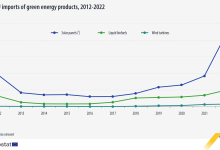The Lasting Impact of Teaching Sustainability in Schools
by Vijay Madlani, CEO of Katrick Technologies
The inclusion of sustainability lessons in the curriculum is a crucial step towards creating a more sustainable future. In 2022, the UK government and the devolved governments, published its policy paper outlining a strategy for the education and children’s services systems to play its role in positively responding to climate change. So, what are the benefits of shaping young minds for the environment?
As the world grapples with the urgent need for sustainable solutions to combat environmental challenges, the inclusion of sustainability lessons in the UK curriculum is a crucial step towards positive development. It can empower students with knowledge and nurture skills and attitudes that inspire environmental awareness, active citizenship, and practical problem-solving.
Today’s youth are demonstrating an inspiring eagerness to learn and a heightened consciousness about sustainability, as evidenced by a recent study by the UK government. The report reveals that around 80 per cent of young people aged between eight to fifteen are not only willing but also eager to take proactive steps to help the environment.
This surge in interest among the youth is indicative of a generation that is deeply committed to safeguarding the planet’s future. They’re not just passive observers; they are actively seeking knowledge, solutions, and ways to reduce their ecological footprint.
The United Nations’ (UN) fourth sustainable development goal (SDG) — Quality Education affirms the notion that education stands as one of the most potent and verified means for sustainable development. Providing inclusive and high-quality education for everyone remains a priority goal. For this goal to be successful, it relies on countries to invest in their education systems at a high level.
It underscores the progress made in achieving universal primary education since 2000, with increased enrolment rates and reduced numbers of children out of school. The goal focuses on the value of education, recognising it as a tool for sustainable development.
Countries that actively take part in in the partnership for the goals play a vital role in advancing sustainable development.
Therefore, the incorporation of sustainability education into the curriculum is a strategic investment in our collective future. It empowers students with a comprehensive understanding of environmental issues, encouraging them to become informed and responsible citizens. Furthermore, it equips them with the skills required to address complex sustainability challenges.
Sustainability education serves as a catalyst for developing environmental consciousness among students. It exposes them to critical concepts related to climate change, biodiversity conservation, resource management, and the interconnectedness of ecosystems.
By learning about the consequences of unsustainable practices, students are more likely to make eco-conscious choices in their daily lives. They can become advocates for sustainable living, influencing their families and communities. This ripple effect creates a more environmentally responsible society, reducing carbon footprints and promoting sustainability.
Sustainability education also fosters active citizenship. It encourages students to engage in real-world environmental issues, becoming active participants in local and global sustainability initiatives. By understanding the interplay between policies, industries, and the environment, students are better equipped to advocate for positive change.
Moreover, sustainability education instils a sense of responsibility towards future generations. Students learn about the impact of current actions on the well-being of the planet and its inhabitants. This knowledge can motivate them to take an active role in shaping policies and practices that prioritise sustainability.
Cultivating practical problem-solving skills
These skills are not limited to environmental issues; they transcend disciplines and prepare students for a wide range of careers. Whether in science, technology, business, or government, individuals with a background in sustainability education possess a valuable skill set that can drive innovation and positive change.
Sustainability education directly contributes to SDG 4 by ensuring that all students receive education that promotes lifelong learning opportunities. It also advances SDG 13 – climate action, by raising awareness and inspiring action on climate change, which is central to achieving a sustainable future.
In 2021, Katrick Technologies collaborated with Glasgow City Council and STEM Glasgow on a community engagement project which involved students from seven schools to submit their designs for its patented wind panels. The aim of the design competition was to introduce young minds to real life renewable technology.
The Katrick team also gave presentations to the schools to educate about their innovative green energy technologies and how young people can themselves get involved in careers in renewable energy.
With education and community outreach being a large part of Katrick Technologies’ culture, one of its main goals is to actively involve institutions and the community in their work, hoping to inspire others, of all ages, to consider careers in renewable power and the environment.
When students are exposed to sustainability concepts in school, they are more likely to pursue careers in fields such as renewable energy, green technology, and environmental engineering. Through hands-on experiences, students gain a deeper appreciation for nature and a heightened awareness of the environmental challenges we face.
The future of sustainable technology depends on a workforce that is not only skilled but also deeply committed to sustainability. By supporting sustainability education, we invest in the education and training of the next generation of innovators, ensuring that they are equipped to create the sustainable solutions our world urgently needs.
Founded in 2016, Katrick Technologies is a green energy start up. It is focused on innovative engineering technologies, performing energy research and development of eco-friendly concepts for a more sustainable planet.
Katrick Technologies utilises unharnessed energy, reducing carbon footprint in a profitable way. It has designed and patented technologies to capture and convert energy from waste heat, wind, and waves into mechanical vibrations, using them to produce carbon-free electricity.







